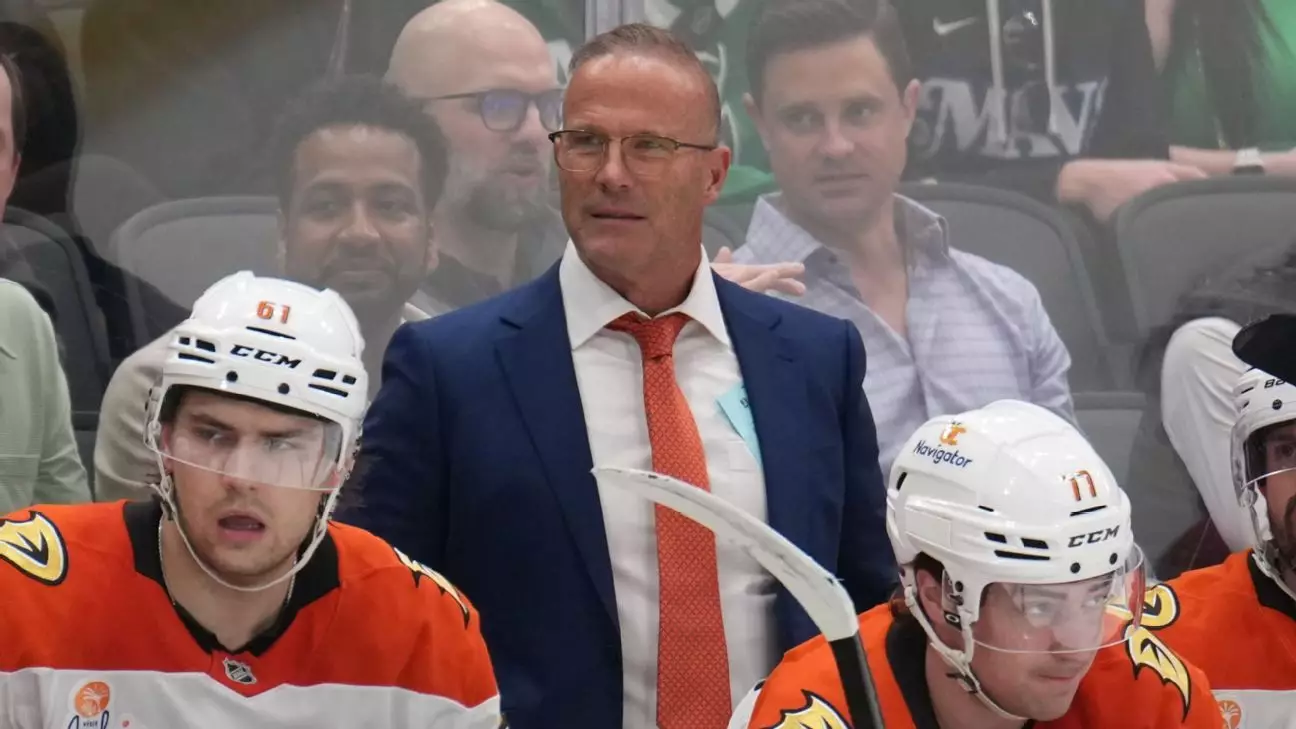The Anaheim Ducks have embarked on a pivotal journey as they part ways with head coach Greg Cronin after two tumultuous seasons. The decision, announced by the organization, reflects a need for a fresh approach to a team that has been entrenched in a playoff drought for an agonizing seven consecutive seasons. Cronin’s tenure, though marked by gradual progress – a jump from 59 to 80 points – was ultimately deemed insufficient in a league that demands rapid results. This critical juncture comes at a time when the new general manager, Pat Verbeek, is intent on reshaping the team’s identity and trajectory towards competitiveness.
Cronin, who had signed on with the Ducks until 2025-2026, departs following a campaign that revealed stark deficiencies, particularly in offensive production. The Ducks’ lackluster performance, culminating in a 30th place finish in team offense, underscored the challenges that have haunted the franchise in recent years. Verbeek, having taken the helm just over three years ago, faces immense pressure to cultivate the Ducks from their current rebuilding state into genuine Stanley Cup contenders, a task that necessitates bold and decisive actions.
Performance Metrics and the Need for Change
The statistical landscape of the Ducks this past season paints a sobering picture that no coach can overlook. While the defensive unit performed admirably, ranking ninth in save percentage, the offense struggled to garner support for their defense. The combination of Lukas Dostal and John Gibson provided a strong foundation; however, it became clear that the offensive play inevitably hindered the team’s overall success. With a dismal offensive output, it’s no surprise that Verbeek decided a change was necessary to ignite a fire within the team’s performance.
The Ducks’ young core, comprised of emerging talents like Leo Carlsson, Mason McTavish, and rookie Cutter Gauthier, highlights an optimistic future waiting to be unlocked. Yet, the feedback from fans boiling over in discontent regarding Cronin’s handling of these prodigious talents indicates a fracture in the relationship between coaching strategy and player development. Fans are clamoring for their promising stars to be given the reins, not stifled under the weight of a conservative approach that the previous coaching staff demonstrated.
Expectations Transforming Into Reality
As the Ducks navigate this transition, Verbeek’s assertion that the team is on a path toward playoff contention is both a challenge and a promise to loyal fans. For a team which has been mired in mediocrity, the statement signifies a shift in mindset—the organization is no longer content with simply building for the future. Instead, they are aiming for immediate success, and as part of that pivot, the arrival of a new coach may serve as the catalyst needed to unlock their full potential.
Verbeek’s unwavering confidence in the existing squad and their capabilities is provocative. Although he inherited a team layered in shortcomings, his focus on harnessing youth and fostering new talent must coincide with a revitalized coaching philosophy. The Ducks are primed for a renaissance, one that could redefine their standing in the league.
Reflection on Strategy and Player Development
Cronin’s dismissal raises critical questions about coaching philosophies in modern hockey. Fans can’t help but wonder whether the reluctance to foster a more dynamic, younger lineup was a miscalculation on Cronin’s part or indicative of a larger systemic issue within the team. The underperformance of star center Trevor Zegras, battling through injuries, poses equally significant concerns surrounding how effectively the coaching staff can cultivate a player’s potential in a high-pressure environment.
In the aftermath of a coaching change, Verbeek has the opportunity to align the next coach’s vision with the talent already assembled. The franchise needs a leader who not only understands the nuances of harnessing young talents but also encourages an aggressive, forward-thinking style of play that can produce immediate results. For the Ducks, the focus must now be geared toward developing a cohesive vision that utilizes their promising skill players to their fullest potential—if they are to escape the quagmire of perennial disappointment.
In this ever-evolving landscape of the NHL, the Ducks’ situation highlights the continuous dance between rebuilding and strategic implementation. Their upcoming choices will reverberate through their organization for years to come, and in the hockey sphere, a new chapter is waiting to be written—one filled with hope and the drive to reclaim glory.

